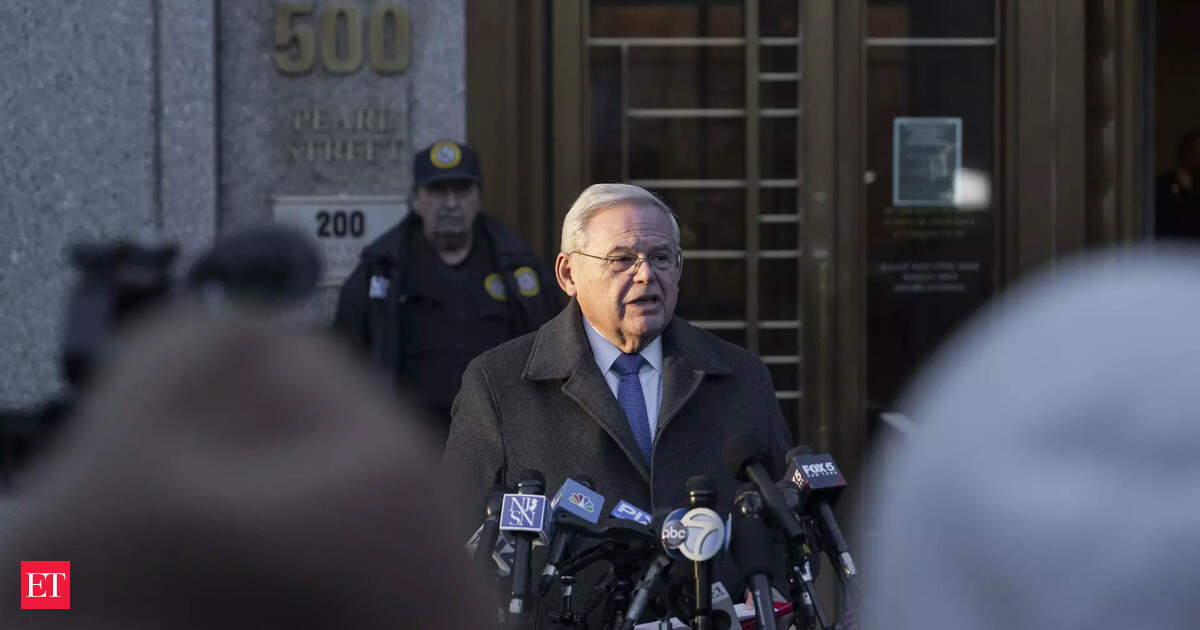But Tuesday, just after 9 a.m., Menendez became a ward of the same government that he once helped to lead when he entered a federal prison in Pennsylvania to begin an 11-year sentence for political corruption.
He will be known as prisoner No. 67277-050 at Federal Correctional Institution Schuylkill in Minersville, roughly three hours away from the home he has shared in New Jersey with his wife, Nadine Menendez, who is expected to be sentenced in September for her role in the scheme. Federal agents found bribes ranging from kilo bars of gold, a Mercedes-Benz convertible and more than $480,000 in cash during a search of the couple’s modest split-level home in Englewood Cliffs.
A federal spokesperson confirmed that Menendez was in the custody of the U.S. Bureau of Prisons soon after a red car with New Jersey license plates was spotted entering and exiting the facility.
After a nine-week trial in New York City, Bob Menendez, a Democrat, became the only U.S. senator ever to be convicted of acting as an agent of a foreign government. Prosecutors have since called the crimes at the heart of a complex, yearslong bribery conspiracy “stunningly venal” and the most serious “in the history of the republic,” as they argued for a sentence even stiffer than the one imposed.
Lawyers for Menendez, who is 71, have called it a death sentence. “It is well-recognized that inmates with a degree of celebrity,” they wrote in a legal filing, “are at increased risk of attention, harassment and violence from their fellow inmates.” The Schuylkill facility includes a medium-security, 980-person lockup that houses notorious criminals like James Coonan, the onetime head of a New York City gang known as the Westies, and Gurmeet Singh Dhinsa, a gas station magnate serving a life sentence for murder.
Menendez is expected to be assigned to an adjacent 225-person minimum-security camp in the complex, where prisoners sleep in dormitory-style rooms, often in bunk beds, according to two people familiar with his prison designation.
The two sites have several things in common, according to Brad Troup, who was convicted of distributing heroin that caused a death and served his final years of incarceration at Schuylkill’s medium-security prison.
Prisoners eat the same meals, can purchase identical items from the commissary and participate in a shared prison industry — electronics repair and recycling. At the camp, prisoners are taught to fix broken electronics, like computers and electrocardiogram machines. Items that are deemed beyond repair go to the medium-security prison, where they are dismantled, and the metals are separated to be sold for scrap, Troup said.
Books can be sent to detainees through approved vendors, and visiting privileges can be adjusted based on behavior.
The population of Schuylkill is about 60% Black, 21% Hispanic and 18% white, according to a recent federal report. And during meals and in the yard, it is highly segregated by race, according to Troup, 47.
“It’s like going back in time,” he said. “Whites with whites. Blacks with Blacks. Gangs with gangs. There’s constant tension.”
Menendez’s training as a lawyer, and his ability to help other inmates draft appeals and legal motions, is likely to be helpful, Troup said.
“The main thing is, you really have to get into the flow of things,” he said. “It usually takes about six months for you to get a pattern. It’s very humbling once you enter prison.”
Before his trial began last spring, when Menendez decided against running for reelection to the Senate as a Democrat, he released a nine-minute video chronicling what he saw as his most meaningful congressional contributions. And few people familiar with the long arc of his career in New Jersey would dispute that Menendez was once among the most influential politicians in Congress.
He worked relentlessly to provide federal assistance to residents devastated by Superstorm Sandy in 2012 and helped to write the legislation to expand health care coverage that became known as Obamacare.
“This is a sad and humbling day,” said Michael Soliman, Menendez’s longtime political adviser who ran his campaigns. “But the jury verdict does not erase Sen. Menendez’s profound and long-standing positive contributions in so many areas affecting New Jersey and the country.
“Those, too, will be a part of his earned legacy.”
Menendez had served as the mayor of Union City, New Jersey, where he was raised, and its representative in the state House before being elected to the U.S. House. He became the first Latino to represent New Jersey in the Senate after being selected for the position in 2005 by Jon S. Corzine, who vacated the seat early to take over as New Jersey governor.
Almost immediately, the federal prosecutors’ office in New Jersey, led at the time by Chris Christie, a Republican, began an inquiry into Menendez tied to rental income on a building he owned. That investigation was closed with no charges filed, and Menendez went on to beat Thomas Kean Jr. — now a U.S. representative — to win a six-year term.
Menendez and his Democratic allies maintained that the inquiry had been motivated by nothing other than politics, but about nine years later, after an unrelated investigation, he would be charged for the first time with taking bribes. A trial in New Jersey ended with a hung jury in November 2017, and prosecutors later dropped the case.
The bribery scheme that put him in prison Tuesday began only a few months later.
Prosecutors with the U.S. attorney’s office for the Southern District of New York spent weeks laying out an audacious , yearslong plot involving a halal meat certification company and the governments of Egypt and Qatar. A jury convicted Menendez of acting as an agent of Egypt, including ghostwriting a letter for Egyptian officials to influence his Senate colleagues and steering arms to the country. He was also found guilty of trying to quash state and federal criminal prosecutions on behalf of New Jersey allies.
“You stood at the apex of our political system,” the trial judge, Sidney H. Stein, said before sentencing Menendez to 11 years.
“Somewhere along the way, I’m sorry to say, you became a corrupt politician, helping to feed the unfortunate cynicism of many people,” he added.
It was the longest sentence ever issued to a U.S. senator. Only five of the 13 senators to be charged with crimes since 1807 were convicted, according to court filings. Until Menendez’s case, the longest sentence imposed had been three years — a penalty issued to Sen. Harrison Williams Jr., also of New Jersey, for his role in a bribery conspiracy that became known as Abscam.
Menendez’s fall from grace led to sweeping changes in his state’s political life. Hours after he was indicted, a young member of the House, Andy Kim, jumped into the race for Menendez’s Senate seat. Kim vanquished the state’s first lady, Tammy Murphy, and, after filing a lawsuit, ended a practice that gave political bosses who thrived during Menendez’s era outsize power to select candidates. Kim became the first Korean American member of the Senate after being elected in November by nearly 10 percentage points.
Last week, a federal appeals panel voted 2-1 to reject Menendez’s request to delay the start of his sentence, pending the outcome of his appeal.
That same day, Menendez took to social media to again plead his case to an audience of one: President Donald Trump, who has granted a flurry of pardons to political allies during the first five months of his second term.
Menendez, in posts on social platform X, has mimicked many of the president’s complaints about a “weaponized” Justice Department. In some, he has tagged Trump. In others, he refers to the president as “DJT.”
“President Trump is right,” Menendez wrote, minutes after he was sentenced. “This process is political and has been corrupted to the core. I hope President Trump cleans up the cesspool and restores integrity to the system.”
Such lobbying efforts have paid off for others, including Mayor Eric Adams of New York, a Democrat, whose indictment on corruption charges was dropped by federal prosecutors. The Justice Department has made clear that some of the offenses for which Menendez was convicted are no longer even a priority.
Long before Tuesday, Menendez had become a pariah in New Jersey.
A former close friend declined to discuss his longtime ally’s fate. His lawyers, Adam Fee and Avi Weitzman, did not respond to requests for comment, nor did Sen. Cory Booker of New Jersey, who in 2017 was willing to vouch for Menendez’s character during his first corruption trial.
For the last year, Menendez and his wife have been keeping their own counsel in New Jersey, former associates say. After Stein granted a weeklong delay to the start of his sentence, Bob Menendez attended Nadine Menendez’s daughter’s wedding in Massachusetts.
On Tuesday, just before 9 a.m., as a heavy fog shrouded the roadway leading into the prison complex, a red car with New Jersey license plates turned into the facility. The car carried a single passenger in the back seat and accelerated as it passed a handful of news reporters waiting at the perimeter of the prison.
The car left about 15 minutes later with only a driver. There was no sign of Nadine Menendez or either of the former senator’s two adult children.
Soon after, a federal spokesperson confirmed in an email that “Robert Menendez is in the custody of the Federal Bureau of Prisons (B.O.P.) at the Federal Correctional Institution (F.C.I.) Schuylkill in Minersville, Pennsylvania.”
Menendez is the last of the three men convicted last summer in the corruption scheme to enter prison. (Jose Uribe, who pleaded guilty to trying to bribe Menendez by giving his wife a Mercedes, cooperated with prosecutors and is expected to be sentenced in the fall.)
Fred Daibes and Wael Hana, who were found guilty at trial of bribing the senator in exchange for political favors, began serving sentences last month at a federal prison in New Jersey. Even before Trump’s blitz of pardons, their lawyers had argued that Daibes’ seven-year sentence and Hana’s eight-year sentence were disproportionate to other recent penalties for political corruption.
“Excessive and brutal,” said Lawrence S. Lustberg, who represented Hana, the founder of a halal meat certification business that was granted a lucrative monopoly by the government of Egypt and was used to funnel bribes to Menendez and his wife.
“Anyone who has ever been to a prison knows that even a day, a week or a month is horrible. But seven, eight and 11 years — that is way beyond what is required for either punishment or deterrence.”
This article originally appeared in The New York Times.








